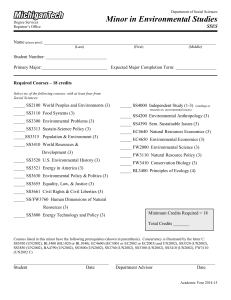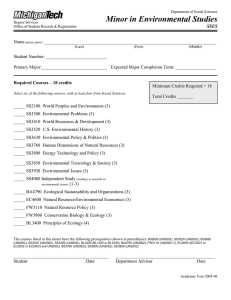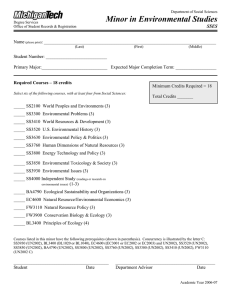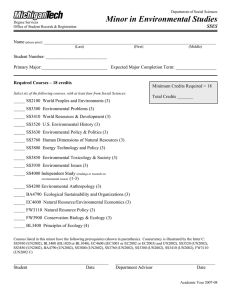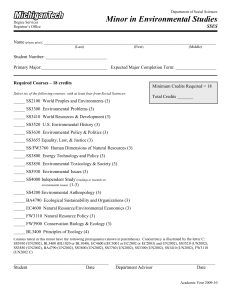SDT Program New Course Catalog Descriptions
advertisement
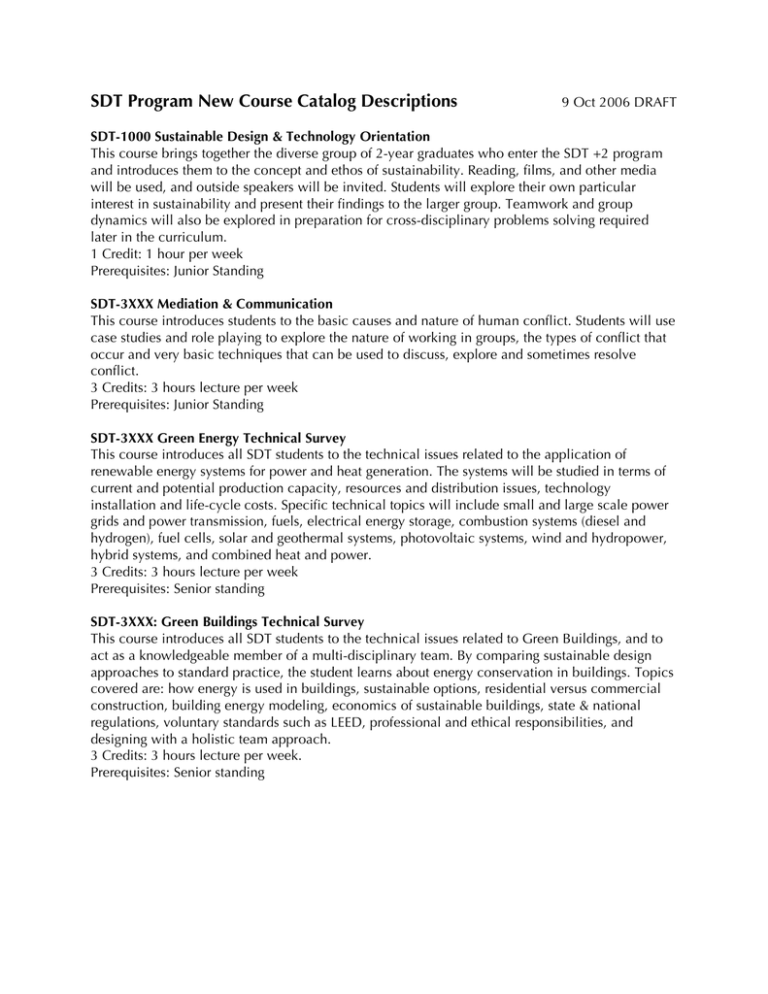
SDT Program New Course Catalog Descriptions 9 Oct 2006 DRAFT SDT-1000 Sustainable Design & Technology Orientation This course brings together the diverse group of 2-year graduates who enter the SDT +2 program and introduces them to the concept and ethos of sustainability. Reading, films, and other media will be used, and outside speakers will be invited. Students will explore their own particular interest in sustainability and present their findings to the larger group. Teamwork and group dynamics will also be explored in preparation for cross-disciplinary problems solving required later in the curriculum. 1 Credit: 1 hour per week Prerequisites: Junior Standing SDT-3XXX Mediation & Communication This course introduces students to the basic causes and nature of human conflict. Students will use case studies and role playing to explore the nature of working in groups, the types of conflict that occur and very basic techniques that can be used to discuss, explore and sometimes resolve conflict. 3 Credits: 3 hours lecture per week Prerequisites: Junior Standing SDT-3XXX Green Energy Technical Survey This course introduces all SDT students to the technical issues related to the application of renewable energy systems for power and heat generation. The systems will be studied in terms of current and potential production capacity, resources and distribution issues, technology installation and life-cycle costs. Specific technical topics will include small and large scale power grids and power transmission, fuels, electrical energy storage, combustion systems (diesel and hydrogen), fuel cells, solar and geothermal systems, photovoltaic systems, wind and hydropower, hybrid systems, and combined heat and power. 3 Credits: 3 hours lecture per week Prerequisites: Senior standing SDT-3XXX: Green Buildings Technical Survey This course introduces all SDT students to the technical issues related to Green Buildings, and to act as a knowledgeable member of a multi-disciplinary team. By comparing sustainable design approaches to standard practice, the student learns about energy conservation in buildings. Topics covered are: how energy is used in buildings, sustainable options, residential versus commercial construction, building energy modeling, economics of sustainable buildings, state & national regulations, voluntary standards such as LEED, professional and ethical responsibilities, and designing with a holistic team approach. 3 Credits: 3 hours lecture per week. Prerequisites: Senior standing SDT-3XXX: SDT Internship Students enroll in the internship upon successful completion of their junior year core curriculum. The internship requires students to spend at least 5 weeks in an employment setting with an institution or firm that is employing, or seeks to employ, sustainable technology. This practicum is designed to broaden a students understanding of how sustainable technologies are implemented in the real world. 1 Credit: 200 hours Prerequisites: Senior Standing or Permission SDT-3XXX: Sustainable Design Studio I Through short team projects, all SDT students will begin to solve interdisciplinary problems in sustainable design, applying basic concepts learned in the Sustainable survey courses and the technical courses in each discipline. Students will work in inter-disciplinary teams, on projects that focus on each discipline. Student teams will participate in a stepped process involving: problem evaluation, design alternatives, calculations, graphic representation, and presentation to the class and a professional panel. 3 Credits: 6 hours studio per week Prerequisites: Junior standing SDT-4XXX: Sustainable Design Studio II This capstone project course will serve to bring multi-disciplinary student teams together to solve a "real life" problem that integrates the knowledge of all the SDT concentrations. Working with a "client" and experts in the field, each team will develop and present their concepts for a sustainable solution. This course requires that students draw upon solid knowledge of the SDT core, as well as the technical courses in their own concentration. The final solutions will be presented to the class and a panel of professionals. 3 Credits: 6 hours studio per week Prerequisites: Senior standing SDT-3XXX Renewable Energy Systems This is course introduces students in the Green Energy track to the installation and maintenance of renewable energy systems. Lab activities includes site selection and metrology for wind power, monitoring and analysis of a grid-tied wind turbine, installation, and analysis of solar arrays, monitoring and analysis of a solar thermal heating system, monitoring and analysis of renewablepellet fired boilers, and visits to methane digesters and combined heat and power systems in Vermont. 3 Credits: 2 hours lecture and 3 hours of lab per week Prerequisites: ARC-3050 or equivalent ELT-2072 SDT-3XXX Green Sites Technical Survey This course introduces students to issues related to Green Sites and includes hands on learning of Geographic Information systems (GIS). Students will gain a broad overview of issues related to site permitting including discussion of water, wastewater storm water, ground water, erosion control, and site utilities in relation to site development. The LEED standards will be introduced. 3 Credits: 6 hours studio per week (Fall) Prerequisites: Junior standing SDT-3XXX Permitting This course introduces student to the Federal, Vermont State and local permitting process. Issues include and introduction to the legal foundation of the permitting process and historic prospective of environmental permits. Typical topics include the Clean Water and the Clean Air Acts, the Vermont 2000 Farm Bill, Act 250 hearings, Planning and Zoning boards. Students will be required to attend permit hearing outside of regular hours. 2 Credits: 1 hour lecture and 3 hours studio per week (Fall) Prerequisites: Junior standing SDT-3XXX Environmental Soils This course will give students and introduction to soils using lecture and labs to gain hand on experience. Topics include the mechanical classification of soils, the identification of the seasonal high water table, an overview of wetlands classification and applicable regulations, and an overview of issues of soils and agriculture. 3 Credits: 2 hour lecture and 3 hours lab per week Prerequisites: Junior standing, LAH-1050 or CET-2011 SDT-3XXX Water and Wastewater This course introduces student to water quality issues, and water and wastewater treatment for centralized and decentralized systems. Students will gain a broad overview of the treatment of water and wastewater including the permitting and regulatory requirements. 3 Credits: 2 hours lecture and 3 hours lab per week Prerequisites: Junior standing SDT-3XXX Groundwater and Stormwater This course introduces student to groundwater, stormwater and erosion control. Students will gain a broad overview of groundwater, stormwater and erosion control including the permitting and regulatory requirements. 3 Credits: 2 hours lecture and 3 hours lab per week Prerequisites: Junior standing ARC-4XXX: Building Controls & Commissioning This final course in the Green Buildings Technical Core looks at two important areas for sustainable commercial buildings: integrated control systems and the hands-on 'fine tuning' that are essential for a building to operate efficiently. The first half of the course will concentrate on an overview of digital control systems: determining needs, setting parameters, and basic system design. The second half of the course focuses on the detailed knowledge needed for the new field of commissioning, now a requirement of the LEED certification process. At the end of the course students may take the testing necessary to become a LEED Certified Professional. 3 Credits: 2 hours lecture + 3 hours studio per week Prerequisites: ARC-4030 (HVAC) & ARC-3040 (Electrical/ Lighting Systems) Which should be 3000 vs. 4000-level? Questions: Gordon: I’ve thrown in some prerequisites. Agree or disagree? Should W & W be a pre-req for Gw & Sw? Do we need to flesh out the water courses some more? Details or how these topics impact certain business or projects? Case studies? Field trips? Objectives & keywords? Or leave these for course outlines? Make sure the ‘studio’ courses come across as hands-on projects courses involving community service. Fall Design I – require 3 hours community service in lieu of a lab or two? Ditto Orientation – community service hours? Make this a prereq for other SDT courses?
